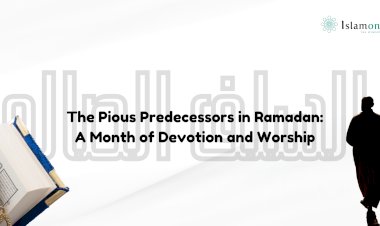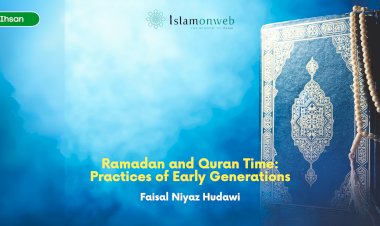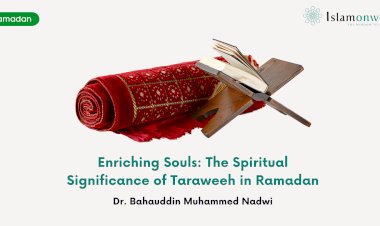With the company of Rasūl ﷺin The Blessed Days of Ramaḍān
In the month of Ramaḍān, a believer gathers values and virtues utilizing the chance to increase good deeds and reap the rewards. In this month, Allah Almighty provides His slaves opportunities to get reward abundantly. Thus, Ramaḍān is the spring of a true believer. It comes as a great message of compassion and mutual love and enters the heart of believers with a warm glow.Allah has distinguished this month from others by sending down the Qur’ān at a night that is greater than a thousand months “The month of Ramaḍān [is that] in which was revealed the Qur’ān, a guidance for the people and clear proofs of guidance and criterion. So, whoever sights [the new moon of] the month, let him fast it; [Al-Baqarah: 185].
Prophet ﷺ used to eagerly wait for Ramaḍān with more hopes and elaborate preparations. He always prayed Allah in Rajab and Sha’bān to take him forth to Ramaḍān. He also persuaded the believers to take spiritual benefits from the spring of virtues.
How did the Prophet ﷺ welcome Ramaḍān?
Prophet ﷺ used to receive Ramaḍān graciously. He not only asked his companions to honor this month with due respect but also showed them how to do so. The Messenger of Allah ﷺ said: ‘This month has come to you, and in it, there is a night that is better than a thousand months. Whoever is deprived of it is deprived of all goodness, and no one is deprived of its goodness except one who is truly deprived.”[1]
The Prophet ﷺ fasted in Ramaḍān for nine years. According to Imām Al-Nawawi, the Messenger of God ﷺ fasted in Ramadan for nine years, because fasting was made obligatory in Sha’bān in the second year of the Hijra, and the Prophet ﷺ died in the month of Rabī’ al-Awwal, eleven years after migration.[2]His condition in Ramaḍān was not the same as in other months, for his day in this month was full of worships and night was filled with obedience. This was due to his knowledge of the true worth of those days that distinguished them from the rest of the year.Sometimes, he observed fasting irrespective of day and night.
Also read : Ḥusn al khatimah the beautiful ending of life
However, he forbade his companion in doing so, telling that that is his speciality. Abu Huraira narrates: The Prophet ﷺ said (to his companions), "Do not fast Al-Wisāl. (Fasting day and night without breaking)." They said, "But you fast Al-Wisāl." He replied, "I am not like you, for at night my Lord feeds me and gives me drink." But the people did not give up Al-Wisāl, so the Prophet ﷺ fasted Al-Wisāl with them for two days or two nights, and then they saw the crescent where upon the Prophet ﷺ said, "Had the crescent delayed, I would have continued fasting (because of you)," as if he wanted to vanquish them completely (because they had refused to give up Al Wisāl).[3]
Prophet’s ﷺ days in Ramaḍān
Prophet’s ﷺ day in Ramaḍān used to start with a pre-dawn meal (Suhūr), which he delayed to the late-night just before Fajr prayer. Among his guidance was having the pre-dawn meal at that time and not to avoid it. Anas bin Mālik (R) narrates that the Prophet ﷺ said: Consume Suhūr (pre-dawn meal);surely, there is a blessing in Suhūr."[4]
The Prophet ﷺ would spend more time with Qur'ān during Ramaḍān.According to a hadīth narrated by Imām Ahmad, as cited by Ibn Abbās (R), Jibrīl used to come to the Prophet ﷺevery night during Ramaḍān and recite the Qur'ān each other.
Prophet ﷺ came to the mosque from his home and led obligatory prayers. He helped his wives while at home. Prophet drew milk from sheep and stitched the clothes on his own. He would help his family and go to the mosque at the right time.

The Messenger ﷺ used to hasten to break the fast. He used to break his fast with fresh dates before he prayed. If no fresh dates, then he would use dried ones. If that too were unavailable, he would consume water. The Prophet ﷺ says:" People will remain upon goodness as long as they hasten to break the fast. Hasten to break the fast, for the Jews delay it." [5]
The Prophet ﷺ was most generous during Ramaḍān. Ibn Abbās (R) reported: The Messenger of Allah ﷺ was the most generous of people and he was even more generous in Ramaḍān when Jibrīl would meet him. He would meet him every night of Ramaḍān to study the Quran. Thus, the Prophet ﷺ would be more generous than a nourishing wind.[6]
Night Prayer
When it was time for Ishā’, he performed Sunnah prayer from home and went to the mosque to lead the congregation.The Prophet ﷺ led Tarāwīh prayer for three nights but discontinued praying in the congregation for fear that it could become compulsory. It was never then offered in the Prophet’s Mosque in his lifetime, while it was performed by everyone at home individually.
Night prayer is one of the Sunnah of the Prophet ﷺ, and it is more desirable in the nights of Ramaḍān. Prophet ﷺ says: "Whoever fasts the month of Ramaḍān out of sincere faith and expecting reward from Allah, all his past sins will be forgiven, and whoever stands for the prayers in the night of Qad’r (Night of Destiny) out of sincere faith and hoping for a reward from Allah, all his previous sins will be forgiven."[7]The Prophet ﷺ used to pray eleven Rak'ahs, prolonging the recitation in each.
Abu Salma bin `Abdur Rahmān (R) narrates: I inquired`Aisha, "How is the prayer of Allah's Apostle during the month of Ramaḍān?" She said, "Allah's Apostle never exceeded eleven Rak`ah in Ramaḍān or in other months; he used to offer four Rak`ah, and do not ask me about their beauty and length, then four Rak`ah, do not ask me about their beauty and length, and then three Rak`ah." Aisha further said, "I said, 'O Allah's Apostle! Do you sleep before offering the witr prayer?' He replied, 'O `Aisha! My eyes sleep but my heart remains awake'!"[8]

Retiring to a Mosque for Remembrance of Allah and Night of Destiny
It is desirable to observe I'tikāf whenever possible, and that is best in Ramaḍān because the Prophet ﷺ used to observe I'tikāf during the last ten days of Ramaḍān until he breathed his last. Abdullāh bin `Umar narrates: Allah's Messenger ﷺ used to practice I`tikāf on the last ten days of Ramaḍān[9]. The reason was to ask for Laylat al-Qad’r (Night of Destiny).
Āisha (R) says: The Prophet ﷺ said, “Look for the Night of Qad’r on the last ten nights of Ramaḍān,' on the night when nine or seven or five nights remain out of the last ten nights of Ramaḍān.”[10]. The Prophet ﷺ urged his companions to strive hard in obedience at these nights. He said: This month has come to you, and in it, there is a night that is better than a thousand months. Whoever is deprived of it is deprived of all goodness, and no one is deprived of its goodness except one who is truly deprived.’’[11]
Gentle Ethics
The Messenger ﷺ was the best of humankind. He behaved finely with people in every situation. During Ramadan, he took more care when he behaved with people. He warned against bad manners in general, and especially during Ramaḍān. Abu Huraira (R) narrates: Allah's Apostle said, "Fasting is a shield (Protection in this world and the hereafter). So, the person observing fasting should avoid sexual relation with his wife and should not behave foolishly and impudently, and if somebody fights with him or abuses him, he should tell him twice, 'I am fasting."[12]
This was the way of the Prophetic life during Ramaḍān. He showed us in a crystal clear manner that how to exploit its days with virtues and obedience. So, let us give due reverence to the sanctity of Ramaḍān, with a hope that we will win the pleasure of God from here and hereafter.
Reference
[1]Ibn Mājah al-Rabʻī al-Qazwīnī , Sunan Ibn Ibn Mājah,Book: 7, Hadīth: 1713
[2]Yahya Ibn Sharaf An Nawawi, Ai-Majmū’
[3]Muḥammad ibn Ismā'īl al-Bukhārī,Sahīh Bukhāri, Book: Holding Fast to the Qur'an and Sunnah,Hadīth : 7385
[4]Yahya Ibn Sharaf An Nawawi, Riyaḍ as-Salihīn 1229
[5]bn Mājah al-Rabʻī al-Qazwīnī, Sunan Ibn Maājah (1768)
[6]Muḥammad ibn Ismā'īl al-Bukhārī,Ṣaḥīḥ al-Bukhārī 1803
[7][7]Muḥammad ibn Ismā'īl al-Bukhārī Sahīh al-BukhāriBook: Virtues of the Night of Qadr 2014
[8]Muḥammad ibn Ismā'īl al-Bukhārī,Ṣaḥīḥ al-Bukhārī , Book: Prayer at Night (Tahajjud) 1147
[9]Muḥammad ibn Ismā'īl al-Bukhārī,Ṣaḥīḥ al-Bukhārī, Book: Retiring to a Mosque for Remembrance of Allah (I'tikaf) 2025
[10]Muḥammad ibn Ismā'īl al-Bukhārī,Ṣaḥīḥ al-Bukhārī, Book: Virtues of the Night of Qadr 2021
[11]Muḥammad ibn Ismā'īl al-Bukhārī,Ṣaḥīḥ al-Bukhārī, Book: Fasting 1713
[12]Muḥammad ibn Ismā'īl al-Bukhārī,Ṣaḥīḥ al-Bukhārī, Chapter: The superiority of As-Saum (the fasting) 1894
(Fahad bin Ibrahim Wafy is a English Teacher at Ministry of Education, Republic of Maldives)
Disclaimer
The views expressed in this article are the author’s own and do not necessarily mirror Islamonweb’s editorial stance.























Leave A Comment